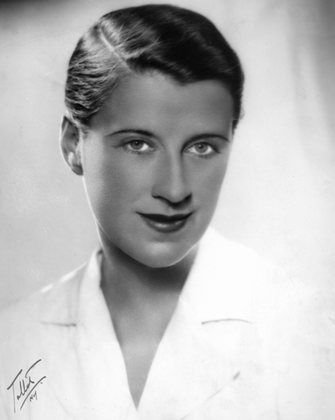Beatrice Lillie (Beatrice Gladys Lillie)

Beatrice Lillie was born in Toronto to John Lillie and wife Lucie-Ann Shaw. Her father had been a British Army officer in India and later was a Canadian government official. Her mother was a concert singer. Beatrice performed in other Ontario towns as part of a family trio with her mother and older sister, Muriel. Eventually, her mother, Lucie, took the girls to London, England where she made her West End debut in the 1914 Not Likely. She was noted primarily for her stage work in revues, especially those staged by André Charlot, and light comedies, and was frequently paired with Gertrude Lawrence, Bert Lahr and Jack Haley. In her revues, she utilized sketches, songs, and parody that won her lavish praise from The New York Times after her 1924 New York debut. In some of her best known bits, she would solemnly parody the flowery performing style of earlier decades, mining such songs as “There are Fairies at the Bottom of our Garden” and “Mother Told Me So” for every double entendre, while other numbers (“Get Yourself a Geisha” and “Snoops the Lawyer”, for example) showcased her exquisite sense of the absurd. Her performing in such comedy routines as “One Dozen Double Damask Dinner Napkins”, (in which an increasingly flummoxed matron attempts to purchase said napkins) earned her the frequently used sobriquet of “Funniest Woman in the World”. She never performed the “Dinner Napkins” routine in Britain, because British audiences had already seen it performed by the Australian-born English revue performer Cicely Courtneidge, for whom it was written.
In 1926 she returned to New York City to perform. While there, Beatrice Lillie starred in her first film, Exit Smiling, opposite fellow Canadian Jack Pickford, the scandal-scarred younger brother of Mary Pickford. From then until the approach of World War II, Lillie repeatedly crisscrossed the Atlantic to perform on both continents. She was long associated with the works of Noël Coward (giving, for instance, the first public performance of “Mad Dogs and Englishmen”), though Cole Porter and others also wrote songs for her. She made few appearances on film, appearing in a cameo role as a revivalist in Around the World in Eighty Days and as “Mrs. Meers” (a white slaver) in Thoroughly Modern Millie. She won a Tony Award in 1953 for her revue An Evening With Beatrice Lillie and made her final stage appearance as Madame Arcati in High Spirits, the musical version of Coward’s Blithe Spirit. In 1954 she won the Sarah Siddons Award for her work in Chicago theatre. Throughout her career as a revue performer, Lillie’s contracts almost invariably stipulated that she would not make her first entrance onstage until at least half an hour into the show; by that point, every other act in the revue had made its first appearance and the audience would be keenly awaiting the entrance of Miss Lillie, the star of the evening.
After seeing An Evening with Beatrice Lillie, critic Ronald Barker wrote, “Other generations may have their Mistinguett and their Marie Lloyd. We have our Beatrice Lillie and seldom have we seen such a display of perfect talent.”[citation needed] Sheridan Morley noted in the Oxford Dictionary of National Biography that “Lillie’s great talents were the arched eyebrow, the curled lip, the fluttering eyelid, the tilted chin, the ability to suggest, even in apparently innocent material, the possible double entendre”. Lillie retired from the stage due to Alzheimer’s disease. Julie Andrews remembered that Lillie, as Mrs. Meers in Thoroughly Modern Millie (filmed in 1966 and released in 1967), had to be prompted through her lines and was often confused on set. Millie was Lillie’s final film. Beatrice Lillie died on January 20, 1989, which was also the date of her wedding anniversary, at Henley-on-Thames. Huck died of a heart attack 31 hours later and is interred next to her in the Peel family estate’s cemetery near Peel Fold, Blackburn.
Born
- May, 29, 1894
- Canada
- Toronto, Ontario
Died
- January, 20, 1989
- United Kingdom
- Henley-on-Thames, Oxfordshire, England
Cemetery
- St Margaret Churchyard
- Harpsden, Oxfordshire, England
- United Kingdom



